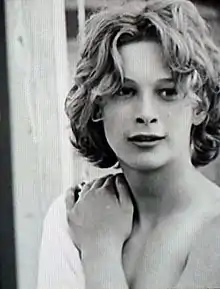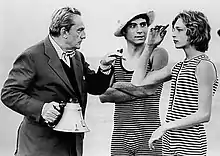Björn Andrésen
Björn Johan Andrésen (born 26 January 1955) is a Swedish actor and musician. He is best known for playing the 14-year-old Tadzio in Luchino Visconti's 1971 film adaptation of the 1912 Thomas Mann novella Death in Venice. He also played a minor role in Ari Aster's 2019 folk horror film Midsommar.
Björn Andrésen | |
|---|---|
 Andrésen in 1970 | |
| Born | Björn Johan Andrésen 26 January 1955 Stockholm, Sweden |
| Occupations |
|
| Years active | 1970–present |
| Spouse |
Susanna Roman
(m. 1983; div. 1987) |
| Children | 2 |

Early life
Andrésen's father has never been identified and his mother, Barbro Elisabeth Andrésen, took her own life when he was 10 years old.[lower-alpha 1] He was then brought up by his maternal grandparents. Part of his schooling was at a boarding school in Denmark.[lower-alpha 1] As a student Andrésen attended the Adolf Fredrik's Music School in Stockholm.[1]
Career
Andrésen had only appeared in one film, En kärlekshistoria (1970), at the time he was cast in Death in Venice, which gained him international recognition. Andrésen's role was as Tadzio, the beautiful young Polish boy with whom the film's older protagonist Gustav von Aschenbach (played by Dirk Bogarde) becomes obsessed. Film historian Lawrence J. Quirk commented in his study The Great Romantic Films (1974) that some shots of Andrésen "could be extracted from the frame and hung on the walls of the Louvre or the Vatican". Following the Cannes Film Festival a year after the premiere of Death in Venice, Andrésen received international headlines as "the most beautiful boy in the world".[2]
Andrésen later described his discomfort with his role in Death in Venice and its director Luchino Visconti, stating that "When I watch it now, I see how that son of a bitch sexualized me."[3] At the time of the film's release, rumours circulated in the United States that Andrésen was gay (as the role demanded that he appear to exchange romantic glances with the protagonist, and on another occasion, be kissed and caressed by another teenage boy), which Andrésen emphatically denied. After the film's premiere, Visconti pressured Andrésen to attend a gay club, where he was made uncomfortable by the staring of adult men; Andrésen later described the experience as "hell".[4][3][5]
Eager to dispel the rumours regarding his sexuality and to shed his "pretty boy" image, Andrésen avoided homosexual roles and parts which he felt would play off his good looks, and was irritated when Germaine Greer used a photograph of him on the cover of her book The Beautiful Boy (2003) without his permission.[6] Greer consulted photographer David Bailey (who owned the copyright for the image) before publishing the book. Andrésen maintained that it is common practice when a party uses an image of a person which has been copyrighted by a different individual to inform the individual and that he would not have given his consent for Greer to use his picture if she had informed him of her plans.
After the release of Death in Venice, Andrésen spent an extended period of time in Japan and appeared in a number of television commercials and also recorded several pop songs. Andrésen has had a strong liking for Japan since then and has visited the country again over the years.[7] Björn Andrésen's arrival in Tokyo has been described as being similar to the Beatles landing in the U.S. The young actor was met with mass hysteria and received an enormous amount of female attention.[8]
Andrésen has appeared in several other films.[9] These include Smugglarkungen (1985), Kojan (1992), Pelicanman (2004),[10] and Midsommar (2019).
In addition to being an actor, Andrésen is a professional musician, and until recently performed and toured regularly with the Sven Erics dance band.[11][12] In 2021 Andrésen was the focus of The Most Beautiful Boy in the World, a documentary detailing his experiences post-fame after the premiere of Death in Venice.[13]
Personal life
Andrésen resides in Stockholm. He has a daughter, Robine (b. 1984), with his ex-wife, the poet Susanna Roman (m. 1983-1987).[14][15] Andrésen and his ex-wife Susanna had another child, a son named Elvin, who died of sudden infant death syndrome at 9 months of age. Andrésen fell into a long depression following the death of his son. In an interview in 2020, Andrésen stated that he believes he will meet his son again "in the afterlife".[16] Andrésen has two grandchildren, a boy and a girl.[17]
Filmography
- 1970 – A Swedish Love Story (Swedish: En kärlekshistoria)
- 1971 – Death in Venice
- 1977 – Bluff Stop
- 1982 – The Simple-Minded Murderer (Swedish: Den enfaldige mördaren)
- 1982 – One-Week Bachelors (Swedish: Gräsänklingar)
- 1985 – The Smuggler King
- 1986 – Whiskers and peas
- 1987 – Luminous landing (TV series)
- 1989 – Dandelion Children (Swedish: Maskrosbarn)
- 1989 – That was then... (TV series)
- 1990 – A la recherche de Tadzio (9 minute documentary directed by Étienne Faure with film and interview of Andrésen)[18]
- 1990 – Lucifer - Late summer yellow and black (Swedish: Lucifer – Sensommer gult og sort)
- 1991 – Agnes Cecilia – en sällsam historia [Agnes Cecilia - a strange story ]
- 1993 – Kojan
- 1994 – Rederiet [High Seas or The Shipping Company] (TV series)
- 2004 – Pelicanman (Finnish: Pelikaanimies)
- 2004 – The Grave (2004 TV series)
- 2005 – Lasermannen (TV series) [The Laserman]
- 2006 – Book of the Worlds (Swedish: Världarnas bok) (TV series)
- 2010 – Wallander – Arvet [The Heritage]
- 2016–2017 – Spring Tide (TV series) (Swedish: Springfloden)
- 2016 – Shelley
- 2017 – Jordskott (TV series)
- 2019 – Midsommar
- 2021 – Agatha Christie's Hjerson – Oscar
Documentaries
- 2016: Hotellet [The Hotel][19]
- 2021: The Most Beautiful Boy in the World[20]
See also
- The Beautiful Boy – 2003 book by Germaine Greer
Notes
- As documented in The Most Beautiful Boy in the World (2021), Andrésen discusses family life with his sister. He also discussed boarding school life. The documentary also shows him viewing the police records of his mother's death. She went missing in October 1965 when Andrésen was 10 years old and her body was discovered in woodland in May 1966.
References
- Ashley Wyman (7 November 2014). "Björn Andresen". Ashley Wyman Online. Archived from the original on 24 December 2014. Retrieved 24 December 2014.
- Fallon, Kevin (29 January 2021). "The Tragic Curse of Being the Most Beautiful Boy in the World". Dailybeast. Retrieved 30 January 2021.
- Lang, Brent (30 November 2021). "Björn Andrésen on His Tortured Relationship With Luchino Visconti's 'Death in Venice': 'That Son of a Bitch Sexualized Me'". Variety. Retrieved 20 November 2022.
Andrésen is particularly upset about a time when the director pressured him to go to a gay club where he felt objectified. "It was extremely uncomfortable," says Andrésen. "I was alone with a bunch of guys. I coped with the situation. I got drunk and I don't remember how I got back to the hotel. I think [Visconti] was testing me to see if I was gay."
- Kaufman, Sophie Monks (26 July 2021). "Death in Venice and how film has mistreated child stars". BBC. Retrieved 20 November 2022.
Andrésen recounts in The Most Beautiful Boy in the World that during filming, Visconti had warned the crew that he was sexually off limits – but this protection ended once the film was wrapped, when in Andrésen's words, he had "served [Visconti's] purpose". After the Cannes premiere, he was taken to a gay club by Visconti while very drunk, an experience he describes in the film as "hell".
- "'I'm not Germaine's toy,' says cover boy". Fairfax Digital. 18 October 2003. Retrieved 25 December 2008.
Andresen said that when he was 16, Visconti would take him to gay clubs where he was made uncomfortable by grown men staring at him: 'They looked at me uncompromisingly as if I was a nice meaty dish.'
- Seaton, Matt (16 October 2003). "'I feel used'". guardian.co.uk. Retrieved 25 December 2008.
Sometimes he still sees his image as Tadzio in a poster or in a cinema flyer; it used to cause him irritation, but not any more. 'My career is one of the few that started at the absolute top and then worked its way down,' he says. 'That was lonely.'
- A Gentle Viking. Björn Andrésen Archived 3 August 2019 at the Wayback Machine. 26 November 2018.
- Fallon, Kevin (30 January 2021). "The Tragic Curse of Being the 'Most Beautiful Boy in the World'". The Daily Beast. Retrieved 2 February 2021.
- Filmography
- Andrésen may be seen as he is today at the website for Pelikaanimies in which he played a pianist Archived 17 May 2017 at the Wayback Machine
- "The Sven Erics, now without Andresen". Archived from the original on 11 November 2019. Retrieved 6 April 2006.
- "Andrésen plays keyboard in his days with the Sven Erics". Archived from the original on 13 April 2016. Retrieved 9 June 2006.
- "BBC Four - Arena, the Most Beautiful Boy in the World".
- "Skådespelaren Björn Andrésen anklagar sig själv för sonens död". Aftonbladet (in Swedish). Retrieved 31 January 2021.
- "Death in Venice [Morte a Venezia] ***** (1971, Dirk Bogarde, Björn Andrésen, Silvana Mangano, Romolo Valli, Mark Burns, Marisa Berenson) – Classic Film Rview 607". Derek Winnert. 2 January 2014. Retrieved 1 February 2021.
- möter, Katarina Hahr. "Katarina Hahr möter – Lyssna här". Podtail (in Swedish). Retrieved 2 February 2021.
- Radio, Sveriges. "BJÖRN ANDRESEN: Min passion för mamma blev aldrig besvarad - Katarina Hahr möter". sverigesradio.se (in Swedish). Retrieved 1 February 2021.
- Worldcat page for In extremis by Faure (DVD) accessed 4 November 2022
- "The Hotel (2016)". Svensk Filmdatabas – den bästa källan om svensk film. 29 April 2016. Retrieved 1 February 2021.
- "Sundance: 'The Most Beautiful Boy in the World' Doc Lands at Juno Films". Hollywood Reporter. 18 January 2021. Retrieved 20 January 2021.
Further reading
- Dye, David. Child and Youth Actors: Filmography of Their Entire Careers, 1914-1985. Jefferson, NC: McFarland & Co., 1988, p. 6.
- Holmstrom, John. The Moving Picture Boy: An International Encyclopaedia from 1895 to 1995. Norwich, Michael Russell, 1996, p. 308–309.